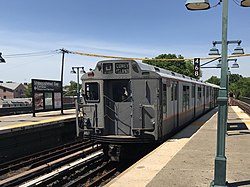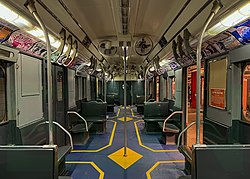This article needs additional citations for verification. (February 2018) |
| R10 | |
|---|---|
 R10 car 3184 at Sheepshead Bay on the Train of Many Metals in 2018 | |
 Interior view of R10 car 3184 | |
| In service | 1948–1989 |
| Manufacturer | American Car & Foundry |
| Constructed | 1948–1949 |
| Entered service | November 20, 1948 |
| Refurbished | 1984–1986 |
| Scrapped | 1983–1984, 1988–1993 |
| Number built | 400 |
| Number preserved | 2 |
| Number scrapped | 398 |
| Successor | R46 R68 R68A |
| Formation | Single units |
| Fleet numbers | 1948–1970: 1803–1852 and 3000–3349 1970–1989: 2950–2974, 3000–3049, 3100–3224 (WH); 2975–2999, 3050–3099, 3225–3349 (GE) |
| Capacity | 56 (seated) |
| Operators | NYC Board of Transportation New York City Transit Authority |
| Specifications | |
| Car body construction | LAHT Carbon steel |
| Car length | 60.3 ft (18.38 m) |
| Width | 10 ft (3.05 m) |
| Height | 12.2 ft (3.72 m) |
| Platform height | 3.76 ft (1.15 m) |
| Doors | 8 sets of 50 inch wide side doors per car |
| Maximum speed | 55 mph (89 km/h) |
| Weight | 81,200 lb (36,832 kg) |
| Traction system | General Electric cars: GE PCM type 17KG116A switch group, with 17KC76A1 master controller, using GE 1240-A3 motors (100 hp or 75 kW each). All four axles motorized. Westinghouse cars: WH ABS type UP-631-A switch group, with XM-179 master controller, using Westinghouse 1447-A motors (100 hp (75 kW) each). All four axles motorized. |
| Power output | 100 hp (75 kW) per traction motor |
| Acceleration | 2.5 mph/s (4.0 km/(h⋅s)) |
| Auxiliaries | Edison B4H (32 Volt) battery with 24 cells. |
| Electric system(s) | 600 V DC Third rail |
| Current collector(s) | Top running Contact shoe |
| Braking system(s) | WABCO SMEE Braking System |
| Coupling system | WABCO H2C |
| Track gauge | 4 ft 8+1⁄2 in (1,435 mm) standard gauge |
The R10 was the first series of post-war New York City Subway cars. They were built by the American Car and Foundry Company from 1948 to 1949 for the IND/BMT B Division. A total of 400 cars were built, arranged as single units. Two versions were manufactured: Westinghouse (WH)-powered cars and General Electric (GE)-powered cars. The R10s introduced many innovations, including an all-welded low-alloy high tensile (LAHT) steel construction, dynamic braking, improved propulsion, and various cosmetic features.
The first R10s entered service on November 20, 1948. Various modifications were made over the years to the R10 fleet, and about 110 cars were lightly overhauled in 1984–1986. Some R10s were replaced by the R46s in the late 1970s; the remaining cars, despite having low reliability rates, outlasted several newer car classes. The remaining R10s were replaced by the R68s and R68As and last ran on October 29, 1989. Two cars have been preserved, while the rest were scrapped.